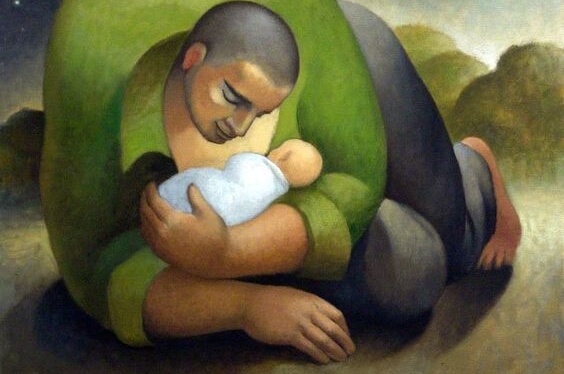A Father May Not Nurse a Child, but He Still Nurtures

A father can also understand how to care for his child and enjoy the every day closeness where he can give affection, cuddle and sing bedtime songs. He can also nurture, even though he cannot nurse the child, he can spend all night taking care of the child, laugh, suffer and worry about that child that is a part of him, even though it did not grow inside of him.
The roles associated with gender are changing and, without a doubt, that is something that is appreciated. Today, the man is not exclusively given the label of the provider in the home. Fathers do not just ‘help’ raise the children, they are not simply auxiliary parents, but rather permanent figures, close-by and always participants in their children’s lives so that they leave an imprint, by nurturing, loving and guiding.
“It is not flesh and blood, but heart which makes us fathers and sons.”
-Friedrich Von Schiller
Something that many educators and specialists comment on in child-rearing is that a child is a part of a tribe. We always talk about motherhood and that intimate bond established between a mother and her child. However, it does not escape us that children grow up in a small microcosm inhabited by their parents, their grandparents, aunts and uncles, parents friends, and teachers.
All interaction, all habits, every gesture and every word leaves an impression on their young brains, and parents have the ability to have a huge positive impact on their children.

The Father as a Figure of Psychological Well-Being
We all know that just as there are good and bad mothers, fathers are also fallible, they make mistakes and there are even those who are present yet absent. So, more than being sources of education and child-rearing, fathers and mothers are people, and depending on their level of maturity and their psychological and emotional balance, they are able to guarantee the best or worst development of their child.
A study carried out at the University of Michigan showed how a father’s own emotional well-being impacts the emotional state of his child. The effects of unemployment, stress or simply erratic behaviors marked by an unbalanced character can have a negative impact on the cognitive development of a child, including their social skills.
A father’s impact on the baby’s development of speech and language is also undeniable. This means that the baby receives a stimulus different from the mothers, with a different tone and sound, and thus will benefit from a broader range of support. In the long run, during the first 3 years of life, that closeness, affection, fun and access to the father strengthen those delicate processes associated with language.

The Nutrients that Father Figures Give
The number of single family homes keeps rising. More and more, fathers and mothers are having to face raising children on their own, either because that is what they have chosen or because that is what destiny wanted. Whatever the case may be, the attention, care and education of a child, above all, requires physical and emotional closeness in order to give that new little life security and real love. Something that both men and women should be able to provide.
“A good father is worth one-hundred teachers.”
-Jean Jacques Rousseau
On the other hand, something we all know is that children do not arrive in the world with an instruction manual, and if that is the case then it is for the simple reason that, they are not machines. Children are made of flesh and bone, of needs, of a heart that beats strongly, and a brain that absorbs everything and is eager to connect with its environment. They need nutrients and the type of sustenance that goes beyond just mother’s milk, they also need what a father knows and can provide.

The Most Valuable Nutrients that a Father Should Provide
Our family and the type of bond with have with them determines a big part of who we are. Far beyond genetics and the blood we share there is an intimate and private structure that builds the kingdom of our emotions, our fears, limitations and also our values. These are all dimensions that a good father should nurture in the proper way. Let us see some examples:
- Emotional availability. The response to the child’s needs and the quality of that response, guarantees an optimal development and more maturity in the long run of the child’s life.
- Recognition. Every child needs to feel recognized and valued by their parents. Being able to count on that look from their father that is vigilant, close, valuable and full of affection influences the development of a healthy self-esteem in the child.
- Participation. A good father does not limit himself to just being there, but rather makes the child feel and want to make discoveries, to awaken new emotions and learning, to be a good listener, a negotiator and a tireless communicator.
- Inspiration. Something that the majority of parents do, is open up new worlds to their children where they can feel competent, while at the same time, being able to discover themselves. Most of our parents passed on to us their passions: their love for music, for books, for nature. Values that now define our lives as adults.
In conclusion, something to remember is that a good parent is not a big kid who enjoys playing and making their child laugh. A ‘real’ father is an adult with great emotional abilities, someone sure of themselves, as brave as any mother and always preoccupied with providing security, encouragement and affection to their child so that they can later spread their wings and become an adult who is free, mature and capable of giving and receiving happiness.
This text is provided for informational purposes only and does not replace consultation with a professional. If in doubt, consult your specialist.








